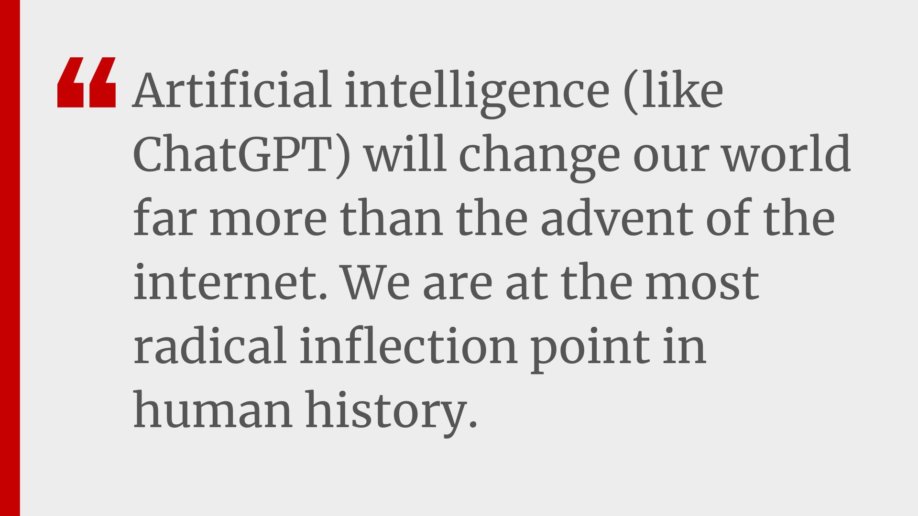If you haven’t already heard about the meteoric rise of ChatGPT (which I discussed in last week’s newsletter), it’s time to start paying attention. Having gained over 100 million users in its first two months, ChatGPT has set the record for the fastest-growing consumer application in history.
Asking humans to predict the growth of A.I. and how it will change our lives over the next several years is like asking a dog to do advanced calculus. We literally have no ability to comprehend what’s coming next.
I know ChatGPT has achieved critical mass within modern culture because even my 13 year old son was talking about it last week while we were cooking dinner. He was telling me how his friends were already trying to figure out how to get it to write their book reports and essays for them. I of course explained to him the virtue of actually learning how to write and how valuable his ability to communicate would be as he grows older and becomes an adult, and those who try to cheat will ultimately pay the price and add to the bottomless pool of mediocre talent in this world.
And then without any outside information to back up my hypothesis – not to mention my extremely limited understanding of A.I. – I boldly made the following assertion to my son:
“Artificial intelligence (like ChatGPT) will change our world far more than the advent of the internet. We are at the most radical inflection point in human history.”
Given he’s only 13 and has no memory of the world before the internet, this was difficult for my son to even comprehend. But I remember the world before the internet with rotary phones, 8-track tapes, and rabbit ears that got you maybe 3 channels on television. So maybe I was just overreacting given how vital my creativity is to my ability to support him and the rest of my family.
Then less than a week later I came across someone else making the same claim I just had, but this time it was someone who probably knows a thing or two about technology, the internet, and its ability to shape our reality.
“ChatGPT will change our world.” – Bill Gates
(Full Disclaimer: Microsoft is now a multi-billion dollar backer of ChatGPT)
There are a billion things that I don’t know about artificial intelligence, how it works, how it learns, and its ability to mimic a human’s ability to do countless tasks both technical and creative.
What I do know, however, is that those who have made a career out of doing formulaic creative work that can be replicated easily are in for a rude awakening. As I already teased in last week’s newsletter → artificial intelligence is going to kill the careers of the mediocre.
I believe the only way to survive the most radical (and rapid) transformation we’ve ever experienced in history is by doubling down on our ability to be humans. The most valuable skill that we must hone & refine is nuance.
Even before the meteoric rise of A.I. I was already screaming from my soapbox about how embarrassingly ineffective our educational system is at preparing creative minds for the real world. To this day the world is still preparing us to become productive members of an early 20th century industrialized society.
We are trained to become cogs on the assembly line of someone else’s dreams.
I have spoken to countless creatives in the entertainment industry who – despite spending hundreds of thousands of dollars on the best educations available and earning top degrees – still feel woefully unprepared to build a creative career in the real world.
And now with the advent of A.I. and programs like ChatGPT, what used to take years to learn can literally be replicated in minutes.
Here’s an example prompt I fed into ChatGPT:
Write a script for a 5 minute short film about a recently divorced woman who works in the big city of New York but travels back to the small town where she grew up and meets a handsome man. They of course fall in love and she decides small town living is more fulfilling than big city life.
What ChatGPT spit out before my eyes in two minutes wasn’t very good. But it was still a useable script. And frankly it wasn’t that much worse than some of the garbage that’s financed, produced, and globally distributed as “entertainment” today.
If we’re going to not only survive but thrive as creatives in the new world that’s to come, we need to stop focusing solely on honing the “hard skills” of our professions – software, workflows, technical skills, etc – and start focusing on the “human skills” that set us apart and bring nuance, uniqueness, and emotion.
I’ve spent an inordinate amount of time the last couple of months literally staring at a white board thinking about how to transform our woefully inadequate educational system. Here’s what I believe are the necessary “human skills” to better prepare creative minds to thrive in the 21st century:
- Time Management
- Energy Management
- Attention Management
- Financial Management
- Goal Setting
- Habit Formation (i.e. Building Systems)
- Creativity
- Learning
- Communication
- Negotiation
- Relationship Building
What am I missing?
What “human skills” (ps I HATE the term “soft skills”) would you want to learn to feel more confident you can build a fulfilling creative career in a world being taken over by artificial intelligence?
This is a vitally important conversation for us to have right now, and I look forward to reading your response. (I read all the messages I receive personally).
Be well.
Zack Arnold
Creator, Optimize Yourself

